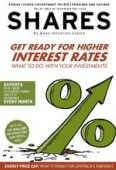Archived article
Please note that tax, investment, pension and ISA rules can change and the information and any views contained in this article may now be inaccurate.
How to spot trouble brewing with one of your investments

A shock profit warning and share suspension from toilet roll maker Accrol (ACRL:AIM) provides a timely reminder to look for negative signs in trading updates.
It was impossible to spot all the negative points that led to Accrol saying current year earnings would be significantly below market forecasts and that net debt had ballooned.
However, there were two signs in the previous trading update (published on 7 September) which raised the risks associated with holding the shares. Investors would do well to study Accrol’s situation and apply the red flag research methodology to other shares. Recent warning signs
Recent warning signs
Accrol’s 7 September update said profitability was ‘broadly’ in line with market expectation. That’s your first red flag. ‘Broadly’ is a term often used by companies to essentially mean below expectations, but not severe enough for analysts to make significant downgrades to their earnings models. In reality it means things aren’t going well.
The second red flag was the sudden departure of the chief executive to ‘pursue other interests’. Company bosses don’t suddenly walk out unless there has been a problem or a disagreement over strategy. The CEO would certainly need to work out their notice period if they’d found another job.
The combination of wobbly trading guidance and the CEO disappearing provided a double whammy of red flags and made Accrol very vulnerable to share price declines until it gave more clarity on matters.
Anyone reading the company’s AIM admission document from June 2016 would have seen reference to currency dangers. It flagged that the business would be negatively impacted if pound sterling depreciated in value against overseas currencies, as it buys most of its paper in US dollars and euros.
Sterling did weaken in the aftermath of Accrol joining the stock market – but it has also recovered strongly this year. That might be why some investors were happy to hold on to the shares.
Accrol announcing a new CEO at the same time as saying the old one was going implied the company was merely bringing in new blood – and one with experience of a FTSE 250 business, namely packaging group DS Smith (SMDS).
Furthermore, many companies use the term ‘broadly’ in line, when referring to trading – and subsequently don’t issue a profit warning. In hindsight, I can see why some investors didn’t spot problems with Accrol. Yet perhaps it has taught us a lesson to not be so forgiving when red flags appear.
Lucky escape
Premier Asset Management fund manager Chris White told me that he sold the final tranche of Accrol shares from his income portfolio on the day before last week’s profit warning.
One of his colleagues had flagged the business as the most likely stock in Premier’s portfolio to issue a profit warning due to a variety of factors, so the fund manager dumped the stock.
You can look for risks to an investment case by using certain search terms on websites that contain official stock market announcements. For example, go to https://investegate.co.uk/ , highlight ‘Keyword’ above the search field and type in either ‘broadly’, ‘challenging’ or ‘weakened’.
That will help you spot companies potentially in trouble. Examples of stocks recently using these words include Filtronic (FTC:AIM), Capita (CPI), Topps Tiles (TPT) and Greene King (GNK).
Important information:
These articles are provided by Shares magazine which is published by AJ Bell Media, a part of AJ Bell. Shares is not written by AJ Bell.
Shares is provided for your general information and use and is not a personal recommendation to invest. It is not intended to be relied upon by you in making or not making any investment decisions. The investments referred to in these articles will not be suitable for all investors. If in doubt please seek appropriate independent financial advice.
Investors acting on the information in these articles do so at their own risk and AJ Bell Media and its staff do not accept liability for losses suffered by investors as a result of their investment decisions.
Issue contents
Big News
- Streamlined BAE aims to fly
- Capita announces new CEO
- Online orders heat up Domino’s shares
- Can exploration make a comeback after North Sea oil discovery?
- Where next for the UK stock market?
- Energy price cap threatens Centrica’s earnings and dividend
- Polar launches new megatrends fund
- Christmas comes early for Cranswick

 magazine
magazine








